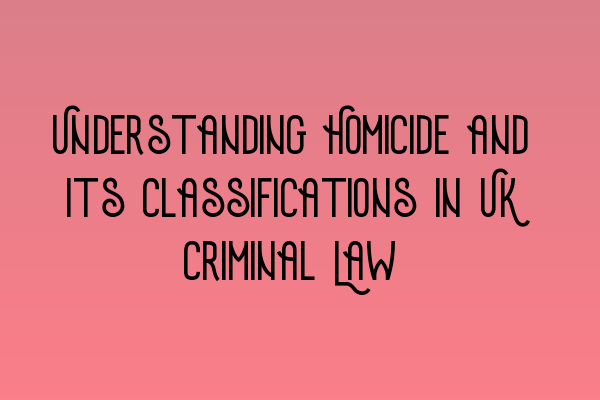Understanding Homicide and Its Classifications in UK Criminal Law
Homicide is a term that encompasses the unlawful killing of another person. In UK criminal law, homicide is a serious offense that is classified into different categories depending on the circumstances and intent involved. In this blog post, we will delve deeper into the classifications of homicide in the UK and provide you with a clear understanding of how they are defined.
1. Murder
Murder is the most severe form of homicide and is considered the intentional killing of another person with malice aforethought. Malice aforethought refers to the intention to cause serious harm or death. The act must be committed with actual intent or knowledge that it is highly likely to cause death or serious harm. In the UK, murder is a common law offense and carries a mandatory life sentence. To prove murder, it must be established that the defendant exhibited intent, premeditation, and deliberation to cause the death of the victim.
2. Manslaughter
Manslaughter refers to the unlawful killing of another person but without the intent to kill or cause serious harm. Manslaughter is often further classified into two categories: voluntary manslaughter and involuntary manslaughter.
a. Voluntary Manslaughter
Voluntary manslaughter occurs when there is an intent to cause harm or kill, but the defendant’s actions were triggered by a sudden and extreme emotional response. This can be referred to as a “heat of the moment” killing. An example of voluntary manslaughter is when someone kills another person upon finding their spouse in bed with another person. It is crucial to establish the immediate provocation that caused the defendant to act in such a manner.
b. Involuntary Manslaughter
Involuntary manslaughter occurs when a person unintentionally causes the death of another person due to their reckless or negligent behavior. Unlike murder or voluntary manslaughter, there is no intention to cause harm or kill. Involuntary manslaughter can be further broken down into two subcategories: gross negligence manslaughter and unlawful act manslaughter.
– Gross Negligence Manslaughter: This occurs when a person’s grossly negligent actions or omissions cause the death of another person. An example of this is if a doctor provides improper medical care that results in a patient’s death due to negligence.
– Unlawful Act Manslaughter: This occurs when a person commits an unlawful act that is not inherently dangerous but ultimately leads to the death of another person. For example, if someone is killed during a robbery, even if the defendant did not intend to cause harm.
3. Infanticide
Infanticide is a unique offense under UK law that applies specifically to the killing of a child under the age of 12 months by their mother. It is classified separately from murder and manslaughter due to the complex circumstances often involved, including the mother’s mental health issues or disturbance caused by childbirth. Infanticide is a serious offense but carries a lesser penalty than murder or manslaughter.
Understanding the classifications of homicide in UK criminal law is essential in order to navigate legal proceedings effectively. If you require legal assistance or representation in a homicide case, it is crucial to seek the expertise of a qualified criminal defense solicitor who has experience in handling such matters.
To prepare for a career in criminal law and gain a comprehensive understanding of the UK legal system, it is recommended to enroll in SQE preparation courses. SQE 1 Practice Exam Questions and SQE 1 Practice Mocks FLK1 FLK2 are valuable resources to help you assess your knowledge and readiness for the SQE 1 exam. Additionally, SQE 2 Preparation Courses are available to equip you with the necessary skills and knowledge for legal practice.
Stay up-to-date with the latest SRA SQE Exam Dates to plan your study schedule and ensure you are well-prepared for the examination.
In conclusion, homicide is a serious offense that carries significant legal consequences. Understanding the classifications of homicide, including murder, manslaughter, and infanticide, is crucial to navigating the complexities of UK criminal law. If you find yourself involved in a homicide case, it is vital to seek the guidance and support of a qualified criminal defense solicitor to ensure the best possible outcome.
Note: The information provided in this blog post is for educational purposes only and does not constitute legal advice. Each homicide case is unique, and legal guidance should be sought for specific situations.
